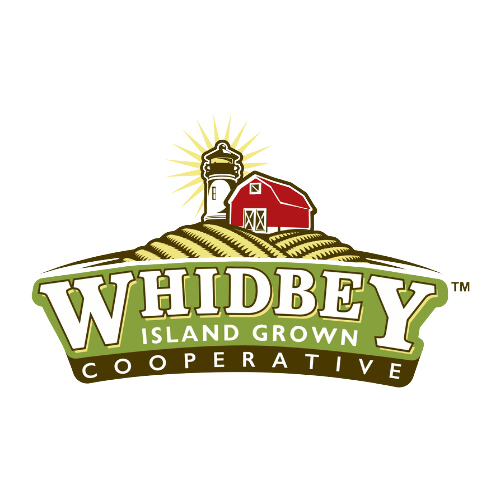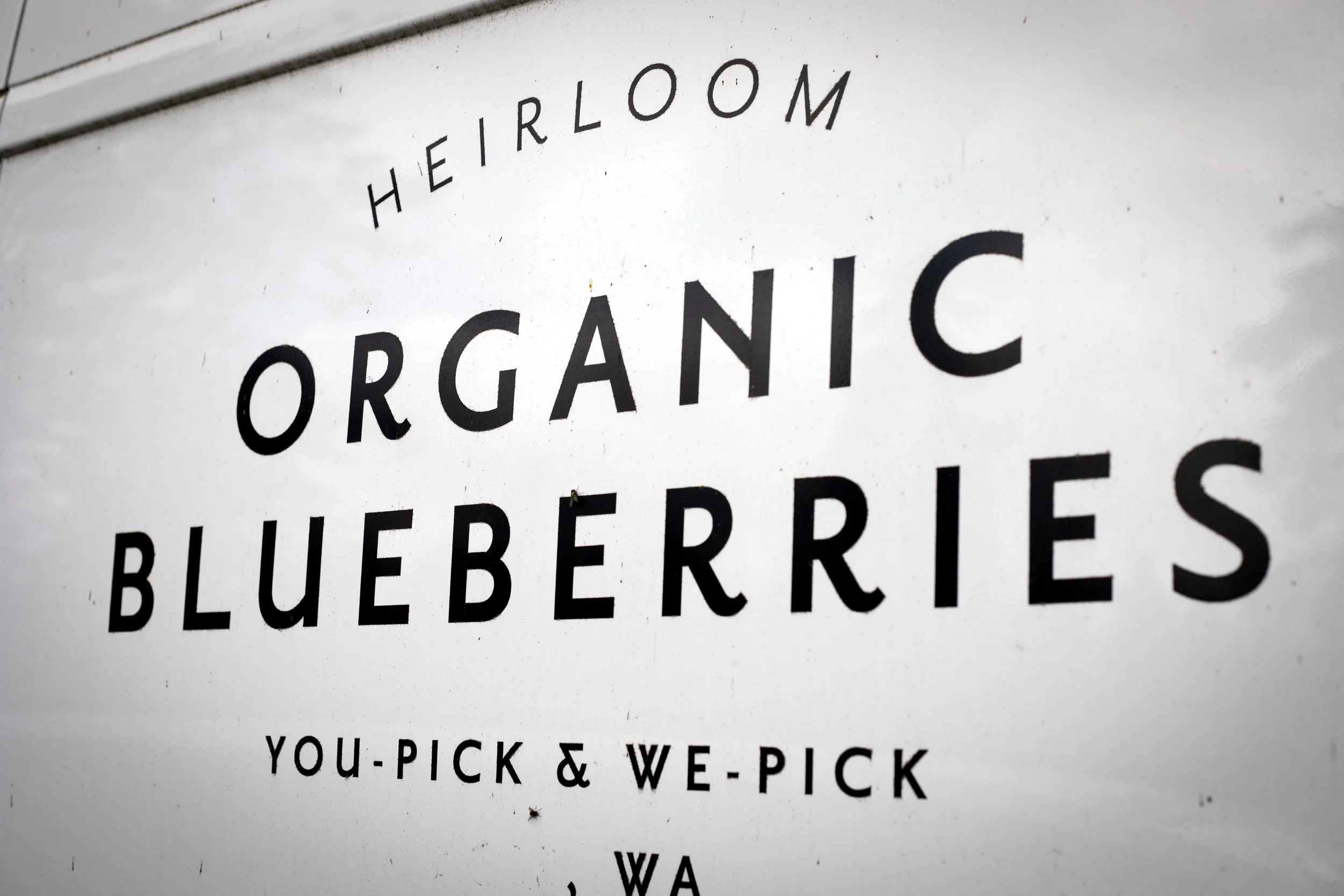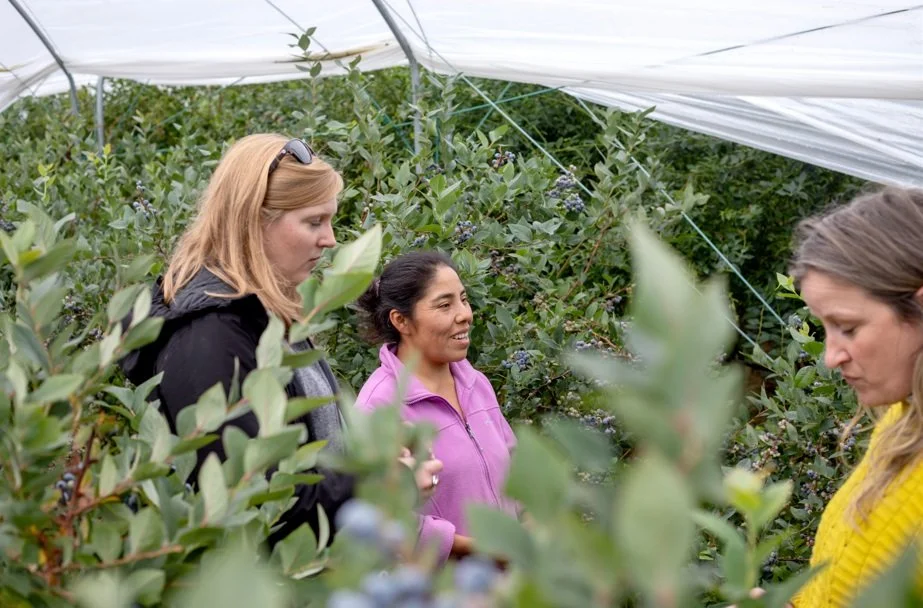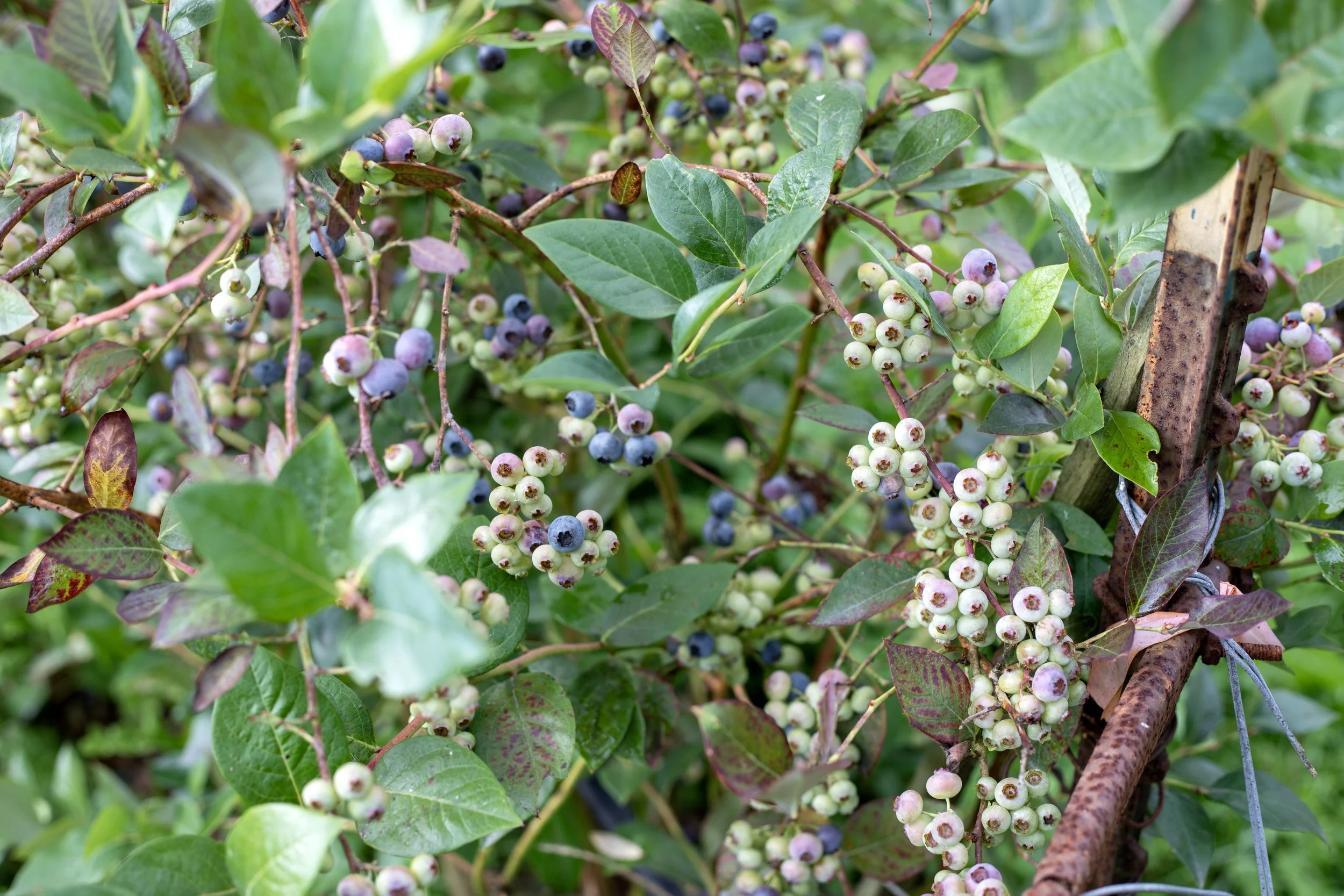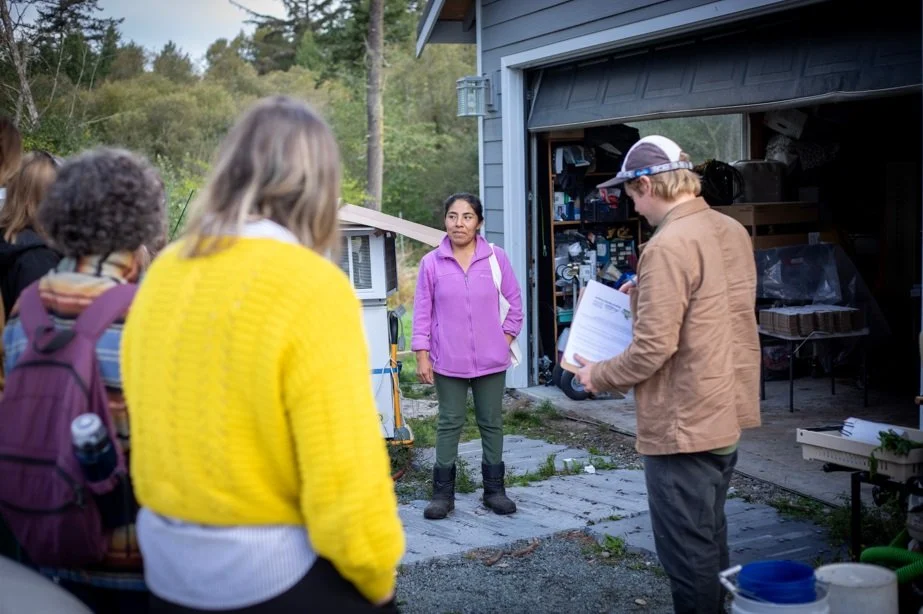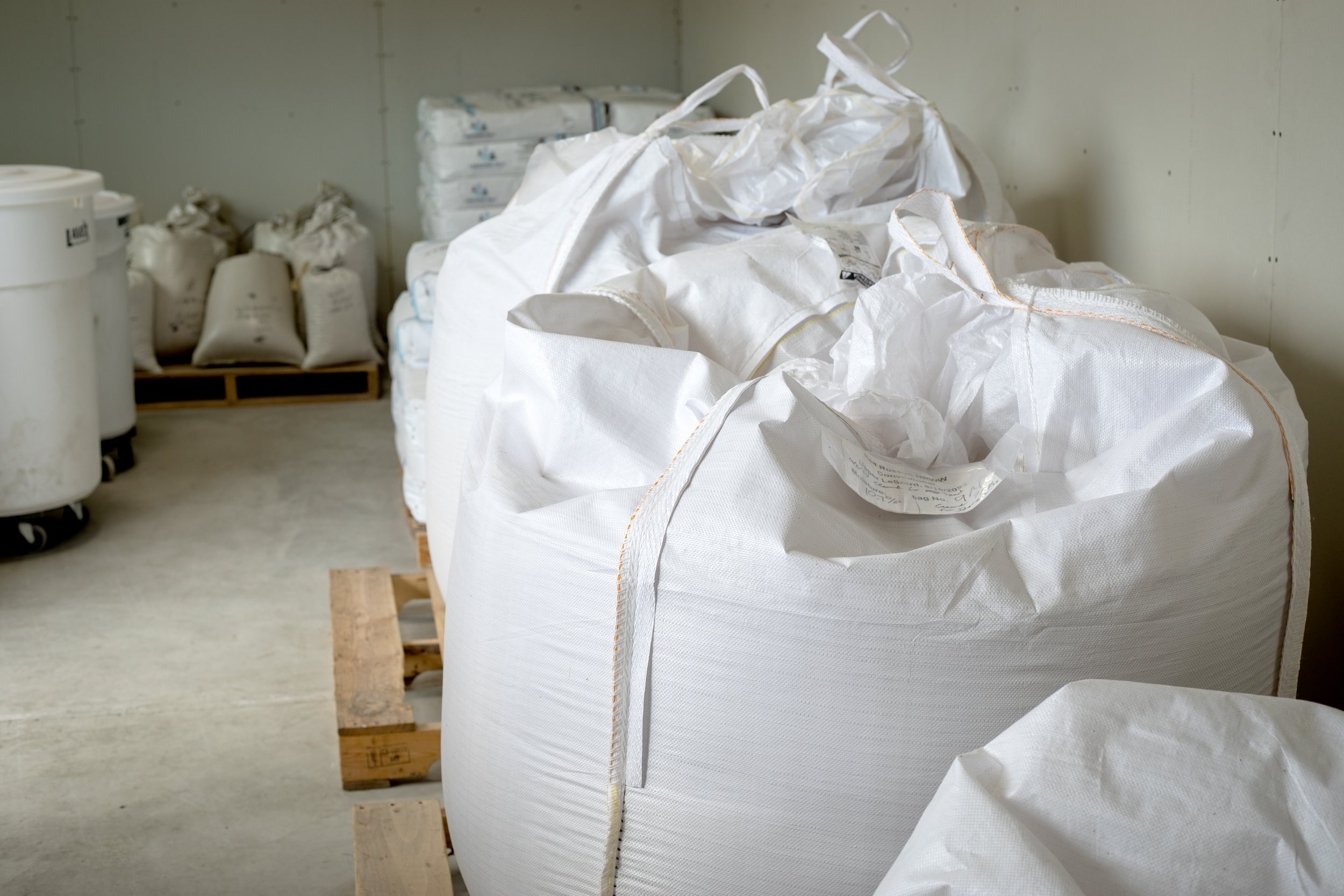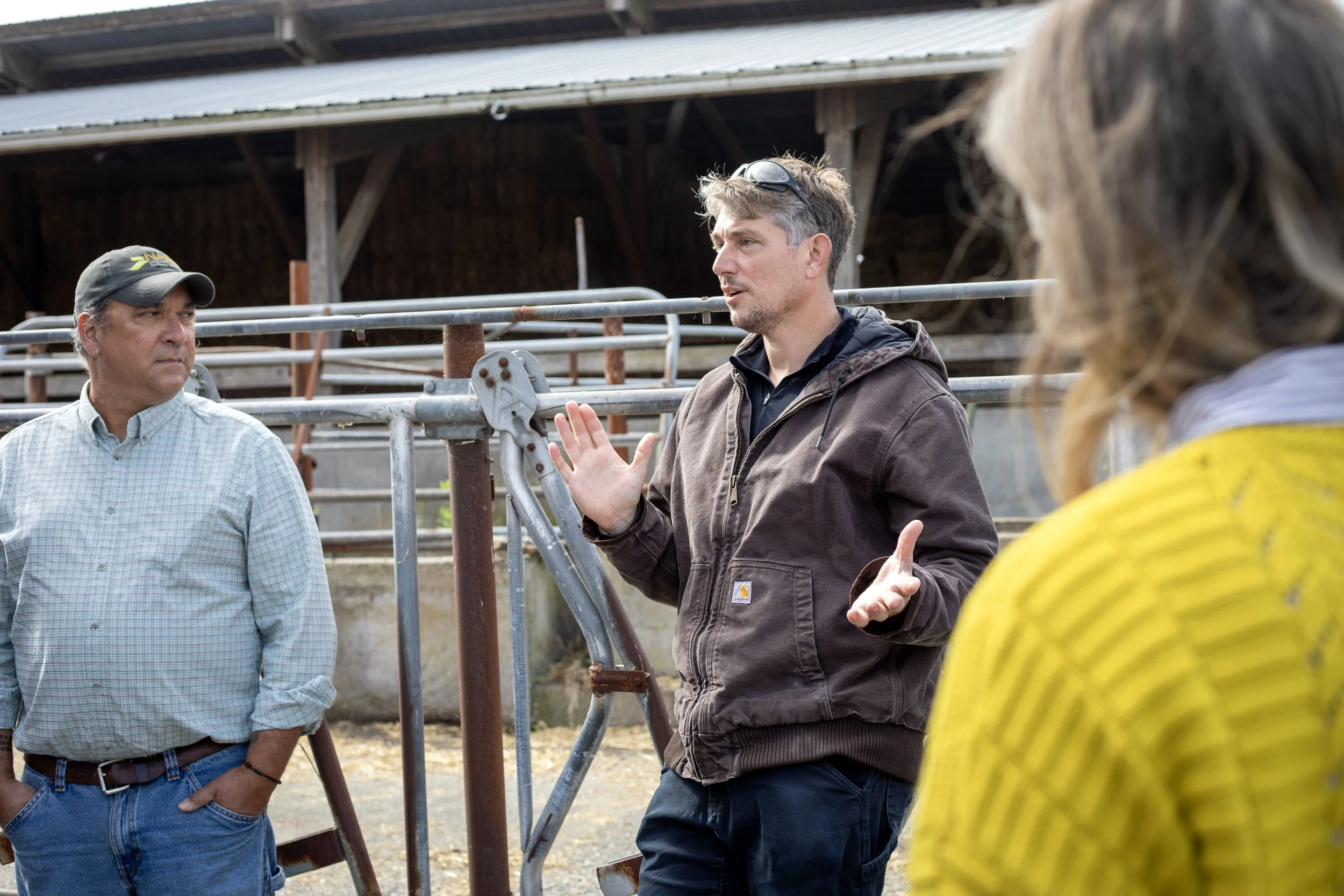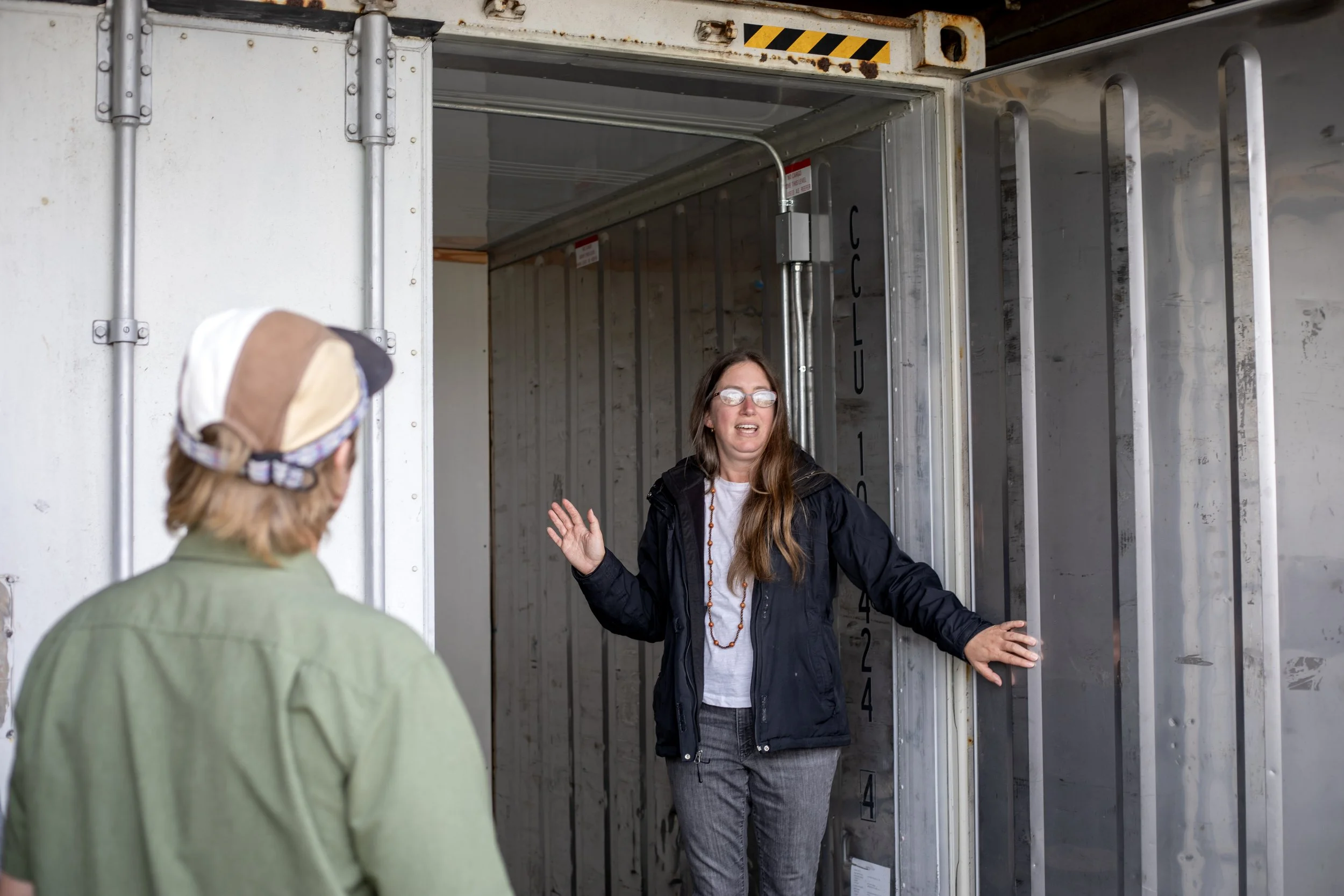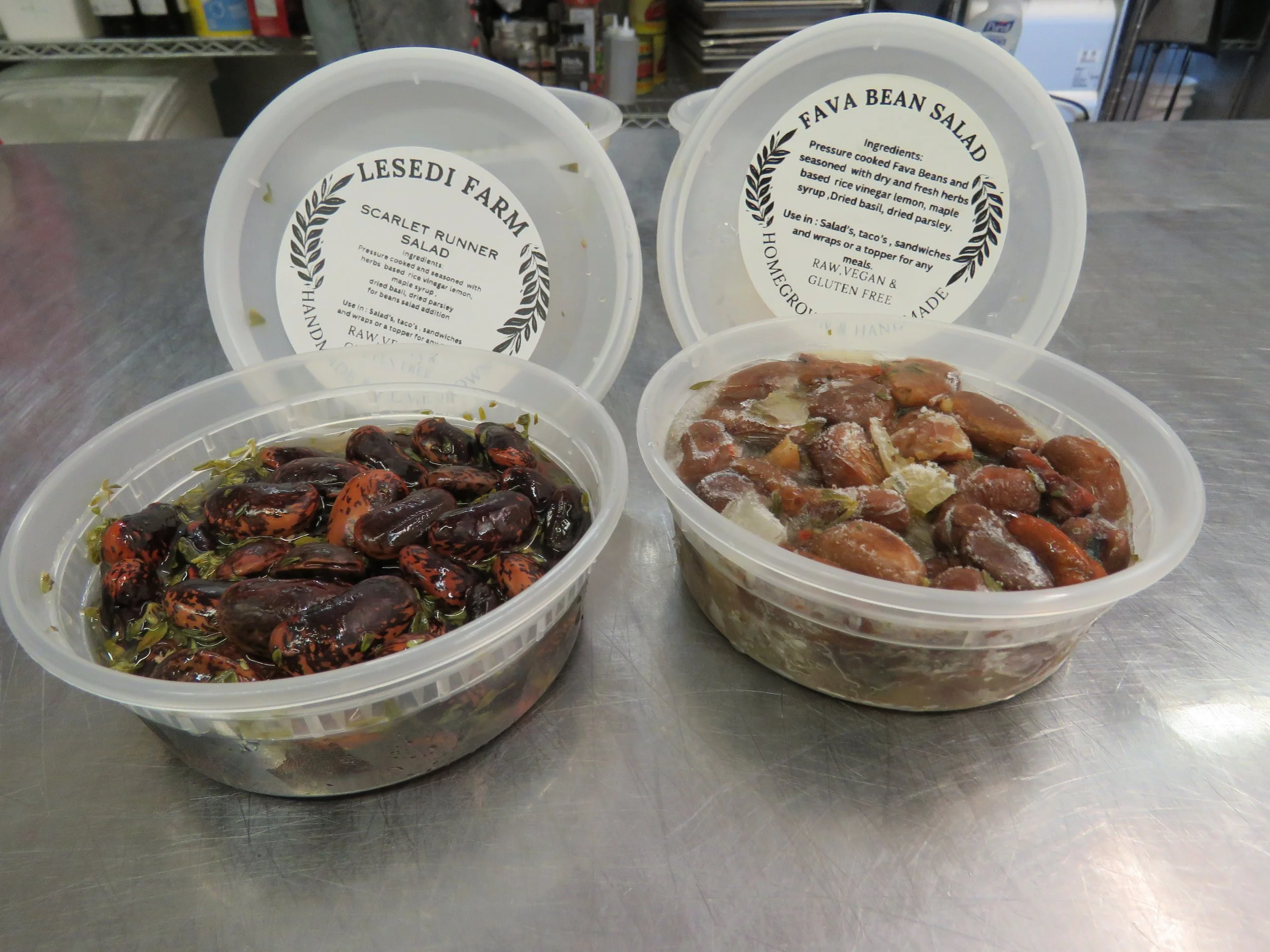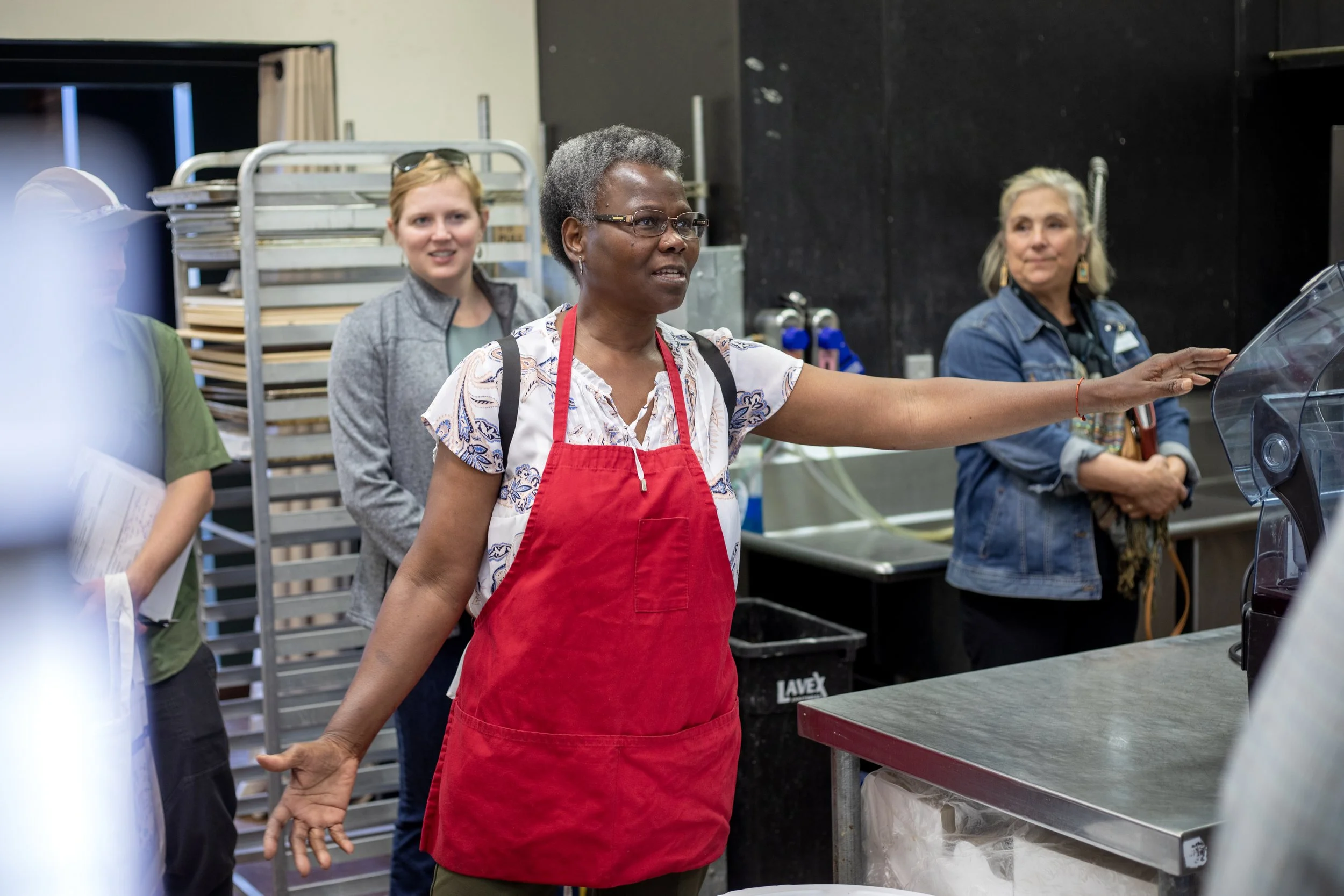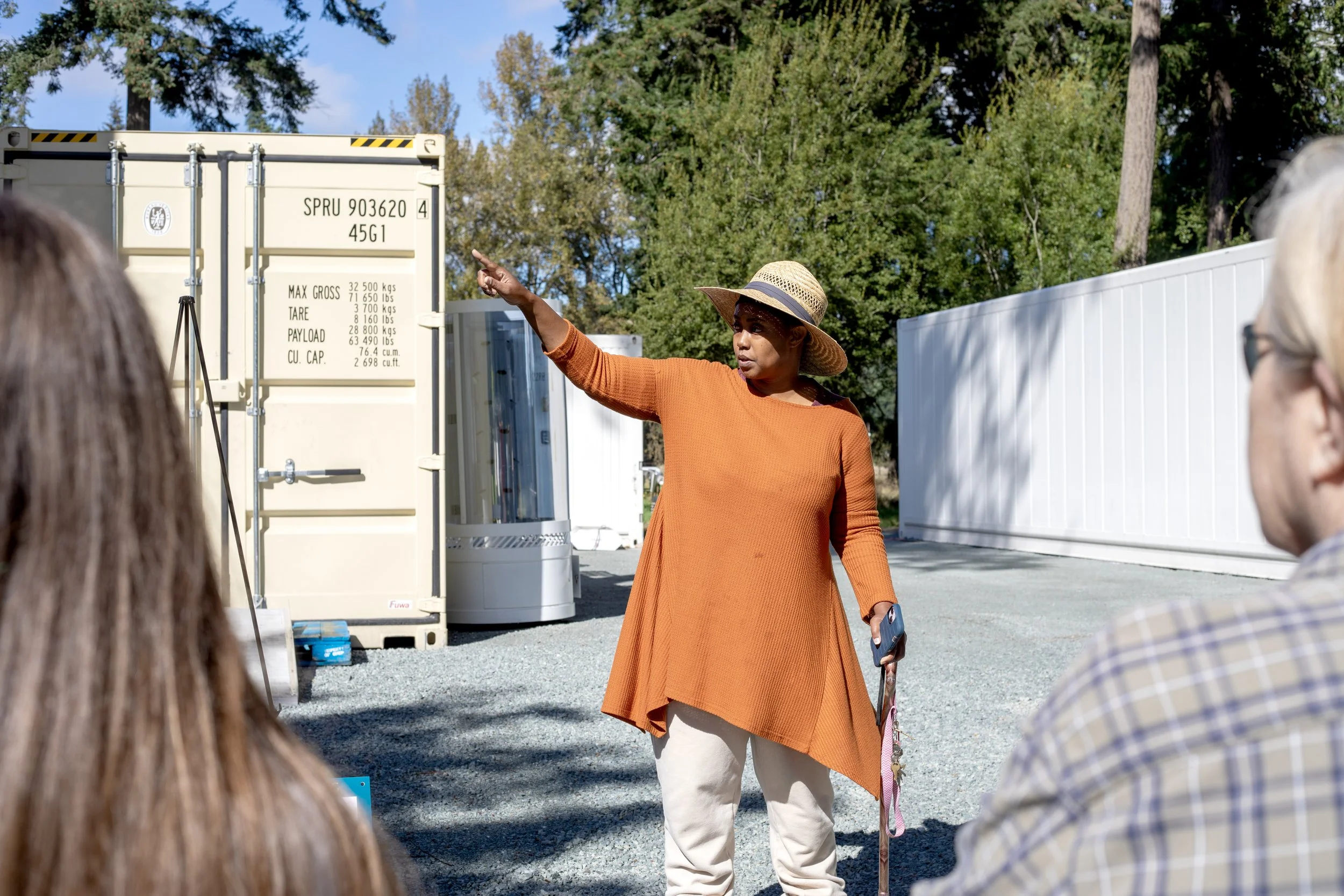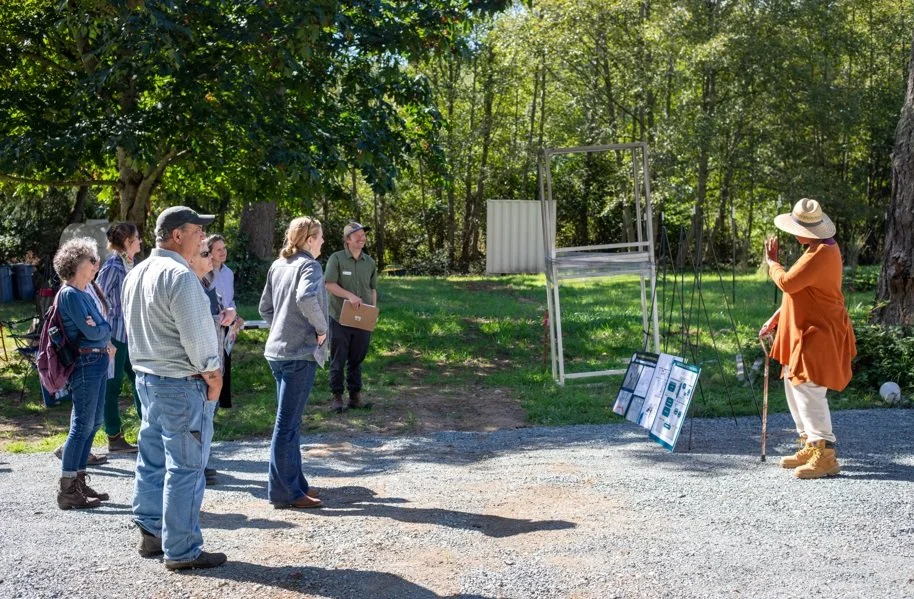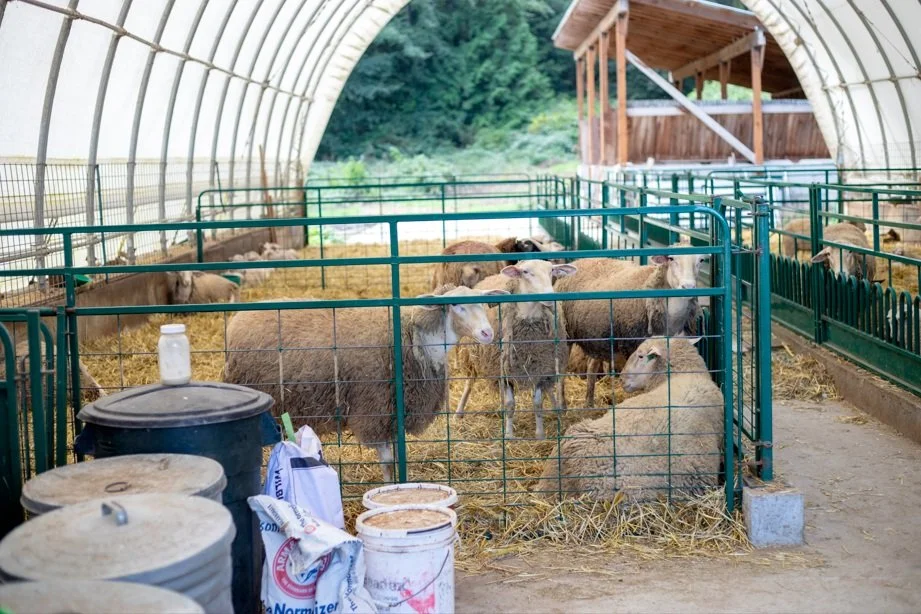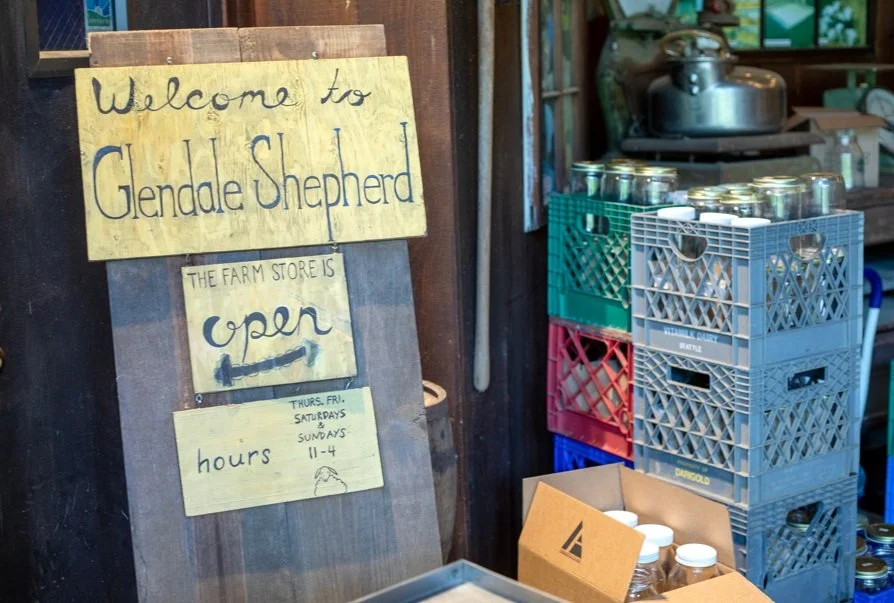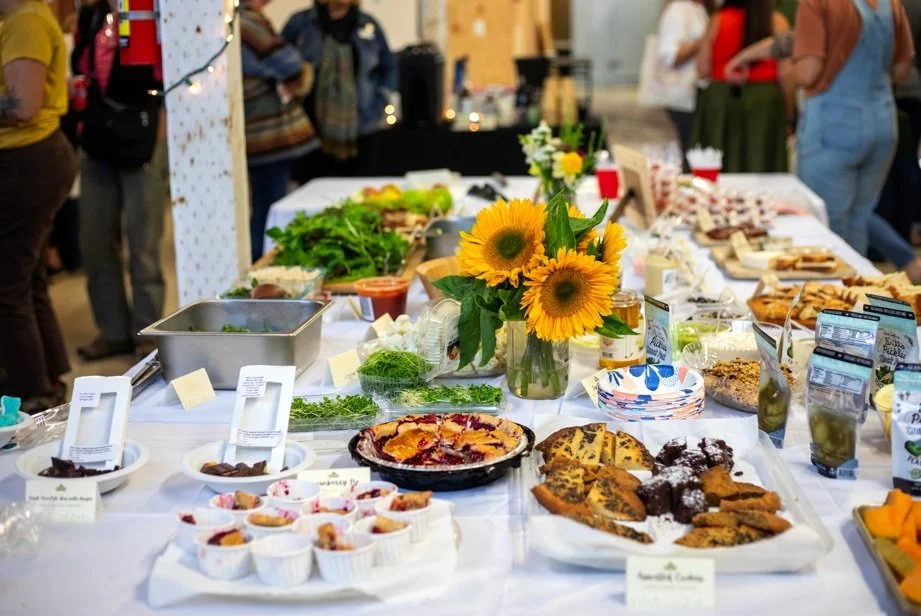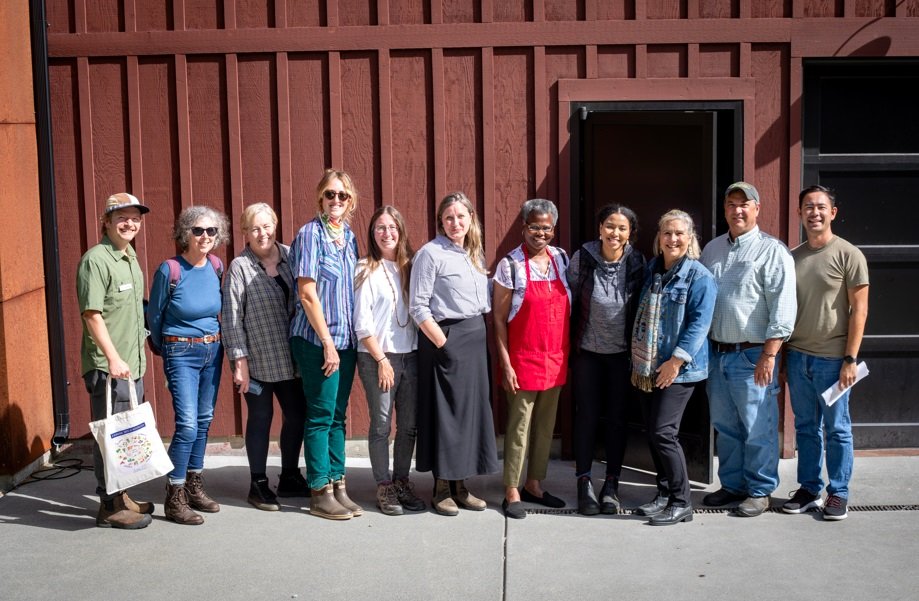
WSDA Grant Project Tour de Whidbey
Whidbey Island Grown Cooperative (WIGC) recently hosted a tour showcasing the completed grant projects of recipients of the Washington State Department of Agriculture (WSDA) Infrastructure Grant. Six out of the seven grant recipients participated, including Silva Family Farm, Ebey Road Farm, Lesedi Farm, Black Seed Farm, Glendale Shepherds, and WIGC, providing an insightful glimpse into their operations and the significant impact of grant funding on local agriculture.
The tour, hosted by WIGC Executive Director Shannon Bly and Board President Alanah Lawrason of Foggy Hill Farm, included WSDA Director Derek Sandison, WSDA Food Policy Advisor Katie Rains, WSDA Regional Markets staff, USDA Rural Development State Director for Washington Helen Price Johnson, WA State Representative Clyde Shavers, Northwest Agriculture Business Center Executive Director Mike Peroni, and Slow Food Whidbey President Karen Meyer.
Whidbey is a well connected community where people want to support their local businesses and food producers. WIGC was honored to share the stories and needs of its farmers with state staff and legislators to contribute to the on-going efforts to bolster resiliency and sustainability in local food systems. Read on for a re-cap of the tour and themes that came up throughout.
Berry Farming in North Whidbey
The day started out in a moody fall fog, with a visit to Silva Family Farm in North Whidbey. The Silvas live out Strawberry Point, a rural area to the northeast of Oak Harbor consisting of acreage properties, hobby farms, pasture, and forest. The Silvas farm strawberries, raspberries, and blueberries. Maura Silva showed the tour their processing equipment and freezer that they bought with their grant funds, and talked about current and future plans for the farm.
Then the tour had the opportunity to go out to the blueberry fields. On the way, they passed the Silvas’ house and flower gardens bright with dahlias, sunflowers, daisies, and herbs. Maura pointed out her favorite, a light pink dahlia as big as a dinner plate.
The Silvas grow three varieties of blueberries that mature at different times throughout the season, allowing them to harvest berries from July into October. The late blueberries keep ripening until hard frosts, which happen at different times each year.
The tour participants got to go under bird netting into the rows of blueberry plants, taller than most of the people, and sample each variety of blueberry. Many of the plant rows are covered with high tunnels to protect from the rain, and surrounded by bird netting to deter birds and animals from eating the berries. Some of the rows hummed with honeybees, whose hives were nestled back in the brush nearby.
The Silvas also have raspberries and currants on their property, and strawberry fields in Skagit. They hope to one day have a large enough farm to include all their berries and a processing facility. More space would also allow them to do some machine picking, which is a good practice for berries destined for jams and juices. Currently all the farm’s berries are handpicked.
The Silvas sell their berries at the Bayview and South Whidbey Tilth Farmer’s Markets, through WIGC Food Hub and Puget Sound Food Hub, and to large markets, wholesalers, and manufacturers. They offered u-pick farm hours during the first two weeks of September as part of Eat Local Month.
Grains of Central Whidbey
As the tour drove back past Crescent Harbor into the town of Oak Harbor heading for Coupeville, the sun began to come out overhead. By the time they reached Ebey Road Farm on the Ebey Reserve prairie, sun shone from above and lines of low fog streaked across the dark blue Olympics across the water.
Surrounded by grain and hay fields, Ebey Road Farm has been operating since the 1800s. The group first toured a barn built in 1899 that now serves as WIGC Food Hub’s North End Aggregation Site and WIGC’s North End Storage Facility. In partnership, WIGC and Ebey Road installed three-phase power to the barn, enabling it to run commercial machinery such as WIGC’s refrigerated storage container. The barn was once used for cows in the farm’s dairy operations, but hasn’t been used since they stopped dairy farming in the 90s. The historic barn recently received a new roof with a preservation grant, and then was cleaned out to house WIGC’s operations, with more room and potential to provide shared services to island farmers in the future.
Then the group headed for a different barn - also converted from dairy operations - where Ebey Road Farm’s 7th generation farmers, the Bishops, house their flour mill. The Bishops grow two types of grain on the Ebey prairie, Lesourd and Red Russian, then use their stone mill to grind it into flour for Little Red Hen Bakery. Little Red Hen uses the flour in their bread and bakery products, supplying their bakery, other restaurants, delis, and markets on the island, and the Coupeville School District’s Connected Food Program.
Each year the grain harvest is different, effected by the temperature and moisture of the weather, and the differences change how the flour acts in the baking process. Working together, the farm and the bakery create multiple mixes of flours for different baked goods, all based on the composition of the grains that year.
After touring the mill, the group had lunch in the nearby garden, dining on Goldie’s Pizzeria pizzas made with Ebey Road Farm flour, salad greens from Foggy Hill Farm topped with Gravenstein apples from Full Cycle Farm and fresh feta cheese from Glendale Shepherds, and quenching their thirst with Mango Lemonade and Hibiscus tea from Lesedi Farm.
Food Processing in Langley
It wasn’t easy to drag the group away from the sunny garden and homemade pizza, but the tour still had many stops to go. Next was Lesedi Farm’s commercial kitchen on Crawford Road. Lesedi Farm has fields where they grow beans, peppers, and other crops for their processed food products like hot sauces, hummus, pesto, cooked greens, samosas, and curries. In a separate commercial kitchen, they process, cook, and package their products for sale at farmer’s markets, events, stores, and on the WIGC Food Hub.
Lesedi Farm owner Dorcas Young and her daughter Maria gave a tour of the commercial kitchen space, nestled in a clearing off a barely two-lane road lined with thick forest. The space is packed full of tables, equipment, ovens and hooded ranges, stacks of sheet pans and bowls. They share the space with other businesses such as Acorn Bakery, which is a way to keep costs down for businesses who don’t want to build out their own costly facility, but it limits when the businesses can operate. In addition, Dorcas can’t operate some of her commercial equipment due to electrical limitations, which means she has to process in small batches.
Lesedi Farm is poised to move to a new, larger facility that has the capacity to run all the commercial equipment they bought with their WSDA Infrastructure Grant. The new facility will allow them to make higher volumes of products at once, allowing them to expand production and generate more sales in less time. For small scale food businesses, efficiencies like commercial grade equipment, space to use it, and storage space for their products are all essential for growth.
Dorcas and Maria have recently completed advanced processor training, which means they are able to create formulas for any type of processed product, and they can train others in processing facility operations and formula creation. At their new facility, they’ll be hosting University of Washington students for processed foods training, and will be able to offer training to new and expanding small scale food processing businesses.
Farm Building in South Whidbey
Next, the tour drove out of the woods to visit Black Seed Agroecology Farms on Thompson Road in Langley. One of their market trucks greeted the tour at the bottom of their gravel road, which winds up around low lying pasture onto the tree-lined ridge above. The space has a leveled gravel area for their containers, parking for their market trucks, and an area with heeled-in fruit and nut trees that will one day be an orchard.
Much of the Black Seed space is in a state of waiting, like the heeled-in fruit trees. They had previously been housing equipment, storage, and vehicles in multiple areas around Everett, where they also have operations, and they’ve been working to consolidate everything to their Whidbey space. They dug a well, which they were happy to find tested great for water quality. They have a generator to provide power to those living on the property. And beyond that, they have many plans in the works.
Adasha Turner gave a talk on the potential and plans for the site, complete with colorful signs showing Black Seed’s mission and the layout plans and mock-up for their Halal processing facility and store. Adasha joked that her co-workers help remind her not to do too much, but there is a lot of work happening at Black Seed.
The Halal processing facility will be one of only a handful in the region. Before it can be built, PSE needs to get power to the property, and then permitting and construction will begin. If anyone can jump these hurdles and succeed, it’s Adasha, but the toll and work of realizing the project is heavy. In addition to the logistical work, Black Seed recently had a fire that destroyed a container of donated hydroponic equipment which was started under suspicious circumstances and is currently being investigated by the FBI due to the type of material used to start the fire. Being accepted and trusted in the Whidbey community is part of the work Black Seed is faced with shouldering in addition to infrastructure and project needs.
Black Seed was bustling, with people working, kids romping, young people showing up to volunteer, and then workers arriving to do work on the well. The tour left for it’s last stop, Glendale Shepherds in Clinton.
Dairy at the Edge of the Island
The drive to Whidbey’s only dairy is a beautiful one, especially on a sunny fall day. Glendale Road, named after the farm, rolls up and down like a rollercoaster with thick forest on either side. Eventually a sign appears warning ‘Road Ends in 1000 Feet’, which leaves drivers curious how exactly the road will end. Luckily, the ending is soft, with the road disappearing into blackberries and brush, and a nice right turn with a sign to Glendale Shepherds. The gravel road winds for many minutes through old growth forest before opening into a beautiful clearing on the side of the bluff with views of Possession Point and the mainland across the water.
Another generations-old farm that started as a tree farm, Glendale Shepherds raises sheep for meat and for their dairy. Their drive circles a stand of trees, and below it is a beautiful wood building which houses their farmstand, their creamery, and their storage facility. The group was able to look in the window of the creamery and watch Emily, licensed cheesemaker, finishing up her day’s work. White cheeses rested in circular trays on racks, rows of cheese in little mounds sat on sheet pans, all waiting to be packaged and placed in the farm stand for sale, or to be taken to the farmer’s market or sold on the WIGC Food Hub.
In the back room, cheese that needs to be aged is stored in the dark, because cheese doesn’t like light. And on the other side of the building, the very last of their sheep meat is stored in freezers. The farm stand room is bright and cheerful, with a peek a boo window of the forested bluff and gorgeous water views.
The group walked down a winding gravel path toward the water, stopping midway to greet the farm’s rams, who were separated in their own pen. The two rams watched the group curiously, pushing each other playfully for the best positioning in the pen doorway.
Next was the dairy room and dairy sheep, nestled in the woods on the side of the bluff. The bottom of the property opens up to a pasture with 8 month old lambs relaxing under the shade of a row of trees, looking out at the gorgeous water views. A covered pen held many more sheep who began calling for food when they saw Farmer Lynn arrive. Behind them sits a three part composting area built in partnership with funds from the Whidbey Island Conservation District to reduce manure run-off. And in front of the pen, a beautiful trailer for hauling sheep that they’d purchased with their WSDA Infrastructure Grant funds. WSDA Staff joked that Glendale Shepherds held the record for fastest use of grant funds, because they already had the trailer in mind and were able to buy it immediately upon receiving their grant award.
The trailer was needed because their butcher service, Island Grown Farm Cooperative (IGFC) had experienced staffing issues and had to cancel its mobile slaughter service, which Glendale had been using to process their animals. The cancellation meant that the animals would now need to be taken to the IGFC processing facilities in Skagit Valley by the farmers themselves, or they would lose their slaughter date and wouldn’t be able to have their meat animals processed. With the quick purchase of the trailer, they were able to keep their slaughter dates.
Cooperative Connections
After a nice hike back up the hill to the main farm, the tour wound its way out of the forest and headed for its final destination, the WIGC warehouse at the Whidbey Island Fairgrounds in Langley. The warehouse comprises half of the Malone Building, a large barn on the fairgrounds property. It is the main aggregation and packing site for the WIGC Food Hub, which takes in around ?? units of local product each week from over 50 small scale food producers and distributes it to restaurants, markets, schools, food banks, and household customers. The warehouse is also a permitted storage facility offering dry, cold, and freezer storage to a dozen local food producers, some of whom operate out of the commercial kitchen facility located on the fairgrounds property.
In addition to a tour of the WIGC warehouse and storage facilities, there was a local food tasting with delicious samples from over 30 local island producers, including veggies, cheese, bread, seafood, fruit, pasta, and drinks. The lovely music of Sage Hayes gave a backdrop for WIGC Co-op Members to meet the tour participants and connect with each other at the end of the main growing season.
Every farmer on the tour dealt with challenges and worked to overcome or circumvent them. Some themes came up in multiple stops.
Staffing - farmworkers were difficult to find and retain, with some farms sourcing off island, some relying on family only, and all wanting more availability of workers.
Permitting and Regulations - the projects of each farm, both current and future, were all impacted by permitting and regulatory requirements that meant uncertain timelines, restrictions on projects, and in some cases the inability to move forward with an opportunity. The dedication and patience it takes to realize these projects takes a toll on business owners who are already working extremely hard.
Infrastructure - lack of infrastructure and lack of opportunities to access or build out necessary infrastructure limits the size and growth of our food businesses. If those opportunities are not accessible, then businesses may have to move off island and take valuable skills with them.
Community Participation - all the farms on the tour work at the systems-level in the community, as members of the WIGC and other co-ops, as board members of organizations like Viva Farms and NABC, as consultants and participants in county and community planning organizations, and more. These farmers give their time to more than their own businesses, and that’s why the impacts of their grant funds create ripple effects out into the community.
Photo Credit: Allyson Meyer, Experience Whidbey
